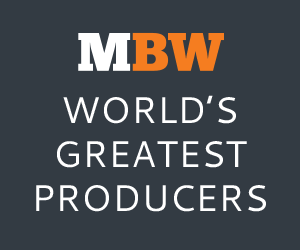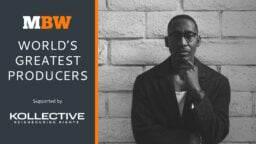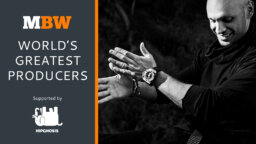MBW’s World’s Greatest Producers series sees us interview – and celebrate – some of the outstanding talents working in studios across the decades. In our latest episode, we catch up with Ian Fitchuk, a game-changing creative collaborator with Kacey Musgraves whose talent and track record stretches way beyond Nashville. World’s Greatest Producers is supported by Hipgnosis Song Management.

Ian Fitchuk was driving home from the studio when the revelation hit him.
The sun was setting blood red on the Nashville skyline and he was listening to the demo of a song called Oh, What A World that he’d just recorded with a fast-rising country singer-songwriter called Kacey Musgraves.
Fitchuk had played on Musgraves’ hit Pageant Material record, but this session saw him more involved as a co-producer and co-writer and it felt both thrillingly different and perfectly right.
“The way I look at the world – nature, human relationships, music, the blending of genres… It all coalesced in that particular song,” he grins, seven years on. “I was thinking, ‘I don’t know where this is going to go, I hope she wants to do more, but I just know I love this and I can’t believe I have the opportunity’. It was just this magical moment of gratitude like, ‘If this as good as it gets, I’m here for it’.”
Spoiler alert: Musgraves did want to do more, and things were about to get a lot better for Ian Fitchuk.
Parts of that enchanted demo actually made it on to the final version of Musgraves’ Golden Hour album – released in 2018 and largely co-written and co-produced with Fitchuk and his friend Daniel Tashian – that would take Musgraves way beyond Nashville. Golden Hour went Platinum in the US and picked up the Album Of The Year award at the 2019 Grammys.
But perhaps more importantly, the Musgraves-Fitchuk-Tashian axis has turned into one of the most enthralling and successful collaborative partnerships out there, taking in both 2021’s Star-Crossed album and Musgraves’ brand-new smash, Deeper Well.
Fitchuk, for his part, was not necessarily expecting to be catapulted onto the producer-writer A-list. Indeed, his style has always been a world away from your typical modern-day hitmaker supreme; far from imposing his style on artists, he’s always happy to facilitate rather than dictate, and eschews chasing current sonic trends in favor of coaxing out an artist’s true essence.
He grew up with church and classical music – his parents were both musicians and teachers in Chicago – with his access to more contemporary hit sounds in the pre-streaming era restricted to what he could pick up from school friends and from saving his dollars to spend on cassettes (“If I could’ve gone onto YouTube and found obscure Afrobeat music at 1 am as a 12-year-old, who knows what I would be doing now!” he quips).
He was in bands in High School, writing multiple potential melodies to fit his friend’s lyrics, not really thinking of what he was doing as songwriting until he moved to Nashville in 2000 to study music.
He arrived just as the city was embracing music beyond country and caught the wave of alternative Nashville sounds from the likes of Kings Of Leon and relocators The White Stripes and The Black Keys. Around the same time, the accelerating Pro Tools revolution gave everyone a studio in their bedroom and, as well as playing in bands, Fitchuk found himself often co-opted to work on his friends’ efforts.
From there, he graduated to producing the likes of Griffin House and Landon Pigg, with the recordings he helped out on often leading to record and publishing deals and sync placements. Suddenly he was a producer.
But it was meeting Musgraves – who he first saw performing at a backyard party in Nashville – that really changed his life. “There was something that really deeply resonated with me,” he says of that backyard show. “I wasn’t overly aggressive about it but, in my mind, I wished we would get to create something together.”

It turned out Musgraves felt the same – her publisher reached out to Fitchuk ahead of the Golden Hour sessions, and the rest is country music history.
And not just country music either – published by Sony Music Publishing, Fitchuk has since been in constant demand for alternative, pop and R&B projects, as well as working with Nashville’s finest. He’s worked with everyone from Sigrid to Reneé Rapp, Leon Bridges to Pink and even played drums on Harry Styles’ Fine Line album.
As well as Musgraves’ Deeper Well, his current projects include Maggie Rogers’ brilliant new single, Don’t Forget Me, plus work on the Bob Marley: One Love – Music Inspired By The Film record, while he’s also exploring various film and TV music projects.
And yet Fitchuk is still happiest hanging out on his couch in Nashville, still keen to work on album projects in a world of one-off songs and – when it comes to both producing and songwriting – still far more interested in quality than quantity.
Time, then, for MBW to catch up with him on that couch, as he affably talks us through working with Kacey Musgraves, co-writing and why there’s no point worrying about AI…
HOW WOULD YOU DESCRIBE YOUR PRODUCTION STYLE?
I’ve always been a collaborator, especially once I moved to Nashville and I was surrounded by people that had grown up writing songs, but needed help finishing them or figuring out how to convey an idea that they had. It’s about being able to hear what somebody’s really saying, read their emotional profile and bring the best out of somebody.
“It’s about being able to hear what somebody’s really saying, read their emotional profile and bring the best out of somebody.”
I’m not interested in regurgitating the past and trying to copy and paste styles and trends of the ‘70s, ‘80s or whatever. But I’m also not trying to find myself in the rat race of hopping on whatever trend is most popular right now.
SORT OF THE OPPOSITE OF THE MODERN ‘SUPER-PRODUCER’ STEREOTYPE THEN?
When people are talking about work that I’ve done, they use words like, ‘It has a certain soul or organic quality or warmth to it’. I would rather have vague terms like that than it be ‘modern country’ or ‘a hip-hop producer’. I like the essence and the feeling of the music that I make to come through more than the genre.
At the same time, one of my biggest influences is Jeff Lynne and there’s an extremely identifiable quality to the music that he makes. I’m not trying to avoid being noticed, but I certainly don’t feel like my aim is to be noticed as a producer. I just want to work with great artists.
ARE SONGWRITING AND PRODUCTION DIFFERENT JOBS TO YOU, OR DO THEY GO HAND-IN-HAND?
Most of the time, they’re hand-in-hand. I just want to make great music, I know that’s a cliché, but, to me, it’s not a prerequisite to be part of the writing of a song in order to produce it.
“the best work comes when I develop a rapport and a connection with an artist, where they’re not just coming to me for a certain sound or trademark.”
I do find that some of the best work comes when I develop a rapport and a connection with an artist, where they’re not just coming to me for a certain sound or trademark.
I’d like to think I have a way of blending myself in with whoever it is, whether it’s a band or an artist. Those lines get blurred, maybe we’ll write some songs together, maybe I can hear between the lines of songs they’ve come in with and know how to shape them to where it feels like a cohesive vision.
But I still produce songs I’ve had nothing to do with and I’m always open-minded to producing singles and not just album projects.
I also have a great passion for connecting people. I love it when an artist comes to town, maybe we’ll write for a couple of days together, but I’ll also pair them with a few people that I think they’ll collaborate well with. I try to have zero ego. I just want the best material possible; in the end, that’s what moves us all forward.
DID YOU REALIZE WORKING WITH KACEY MUSGRAVES ON GOLDEN HOUR WAS GOING TO TRANSFORM YOUR CAREER?
At that point, I’d been in Nashville for almost 20 years, so I’d got to a place in my career where I’d worked really hard and I was really proud of the music I’d made.
I’d had what I would consider a reasonable amount of success – I had a family, I took a couple of vacations a year and I was really happy making music I wanted to make and wasn’t being forced to do things I didn’t want to do. As far as I’m concerned, if you’re in music and can get to that level, you’re extremely fortunate.
I was at peace with my trajectory, but I still had the desire to make something that reached an even wider audience and that was representative of what I could do as a musician, producer and songwriter.
You hope for all those things to come together in a unified way, but it’s very hard. I have friends that have had extreme success in music, but it’s not necessarily representative of who they are and what they can do.
Kacey had had success and was happy and comfortable doing what she was doing, but she’s a very inquisitive person by nature, and she saw me as somebody who was safe and comfortable to be around, in a way that made her want to explore musically.
At the end of the sessions, I was really proud that we had made an album that represented all of our curiosities, interests and intuitions. When it was received the way it was, it was a surprise in that, I wouldn’t have cared if somebody had said they didn’t like it, because I like it and it’s great. But nothing could have prepared me for how much bigger it became.
WAS THERE A LOT MORE PRESSURE ON THE FOLLOW-UP AFTER ALL THAT SUCCESS?
Early on, there definitely was some pressure but then the world shut down [during the pandemic] and that helped.
If the world and the music business had just been turning the way it had been, it would have felt more intense, but we just hunkered down and tried to challenge ourselves musically and lyrically. It was January, it was cold, no one was going anywhere or doing anything so, for us to be able to huddle up in that really tight, private environment and focus on making Star-Crossed was really therapeutic for all of us and helped keep the outside noise out.
I’ll always be really proud of Star-Crossed. Throughout the years since, I’ve had people come up and tell me how meaningful that music has been. It’s a work that will be noticed more over time. But there was no expectation for it to sweep awards the way [Golden Hour] had done before and musically, there was some controversy about it not being eligible for the country category at the Grammys. I found that exciting to be honest!
HOW COME?
If you’re making people scratch their heads, that’s good. I like the idea of being part of music that’s challenging for somebody to categorize or understand.
DO YOU WORRY THAT MAKING ALBUMS IS GOING OUT OF FASHION?
I try not to worry about it too much, because I know how elusive it can be just to get one great song. It’s ambitious to make an album, it’s assuming that people have the time and attention to do so. I just hope I continue to have the opportunity.
I have a hard time believing that the touring business and live performance are going to go away. People love to go and experience music together and, as long as that’s happening, they’re going to need material to play. You could have one big song that everybody’s going to come to hear and that’s fine, but if you have a whole concept and musical landscape to unfold before people, that’s always an incentive.
An album project, a great live show, a story to tell and a concept to convey all work together. Maybe it will become less common, but I don’t fear that it’s completely going away.
IF YOU COULD CHANGE ONE THING ABOUT TODAY’S MUSIC INDUSTRY, RIGHT HERE AND NOW, WHAT WOULD IT BE AND WHY?
I’d really take a look at the publishing structure with streaming services, because it’s having a really dark effect on songwriters’ ability to make a living.
We need to look at the possibility of them participating in the master recording. I don’t know how else streams are going to turn into money for songwriters, I see how they do for royalties on the production side. There’s an inequality there, songwriters really need to be represented just like the writers in Hollywood.
Speaking as somebody that is both on the production and songwriting side of things, I’m very thankful that I’m being paid on the producer side as well, because there’s a great disparity there.
“it’s a daunting perspective if you’re ‘just’ a songwriter right now.”
Even in the country world, with artists just not going to radio anymore, there’s not enough money being made in streaming on the publishing side to make up for the money that’s not being made on terrestrial radio.
The less that songwriters are going to be able to make a living, the [more the] quality of music is going to suffer. There are going to be great artists and people are always going to know how to make music, but the craft of songwriting and people who don’t get on stage but really know how to put a song together, those people need to know they have a viable way of making a living.
Production-wise, participating in the master is helpful, so there’s still incentive to continue to work with smaller artists who have growth ahead of them, but it’s a daunting perspective if you’re ‘just’ a songwriter right now.
HOW DO YOU FEEL ABOUT THE TREND FOR MULTIPLE CO-WRITERS AND CO-PRODUCERS ON EVERY TRACK?
I’m all for everybody getting credit for participating in creating a song. I have no problem with that.
But I have noticed there is a lot more deliberation and litigation in the pop world. In Nashville, there’s an unspoken agreement that if there are four people in the room and the song gets written that day, it gets split evenly four ways.
There are arguments to be made if somebody’s not contributing as much as the others, but when you start to nit-pick what contribution is, it’s a really slippery slope and it’s really damaging to creative relationships. I don’t think it’s worth the trouble. Sometimes, contributing to a song is listening and encouraging and saying, ‘Do you remember when you said this?’ Contribution can look like a lot of different things.
“I’m all for everybody getting credit for participating in creating a song. I have no problem with that. But I have noticed there is a lot more deliberation and litigation in the pop world.”
The part that’s murkier for me is what we’re seeing now with interpolations; when I’m turning albums in to labels, they’re having musicologists look through them to see if there’s anything they can hear where other artists might be coming after you for publishing, which is a little unfortunate.
I’m completely fine with checking in with that artist and getting it cleared. But for them to come back and ask for a large portion of the song… It seems like a dangerous road to be going down. I’m nervous about how greed factors into people coming after you for works that were unintentional [in their similarity]. I’m sure there are some people listening to songs and trying to lift melodies, but I don’t think that’s the norm.
AND HOW DO YOU FEEL ABOUT THE POTENTIAL THREAT TO YOUR CRAFT FROM ARTIFICAL INTELLIGENCE?
So far, I haven’t heard anything that’s convinced me that it’s better. There are still too many nuances to the human voice.
You can pull a loop down from the internet and slap some other loops on it and boom, you’ve got a song. The ease of putting music together has been around for a minute and it’s still required human emotion and ingenuity to make it unique. It’s not helpful to dwell on being afraid of it or trying to suppress it. Just like anything, the more you try to control and avoid it, the more it becomes a darker energy. It’s something to be reckoned with, but I’d like to keep an open mind and we’ll see what happens.
“So far, I haven’t heard anything that’s convinced me that [AI is] better. There are still too many nuances to the human voice.”
I remember in the early 2000s when I moved to Nashville – at that time it was Napster. I remember everybody saying, ‘You picked the worst time to move to Nashville, the music industry is over’ – that was the mindset because the technology was changing, CDs were going away and that was such a cash cow.
And it did impact, it did change everything but, if I’d just packed up then and said, ‘Well, there’s no more money to be made in music, I might as well go find something else to do’, we wouldn’t be having this conversation.Music Business Worldwide




